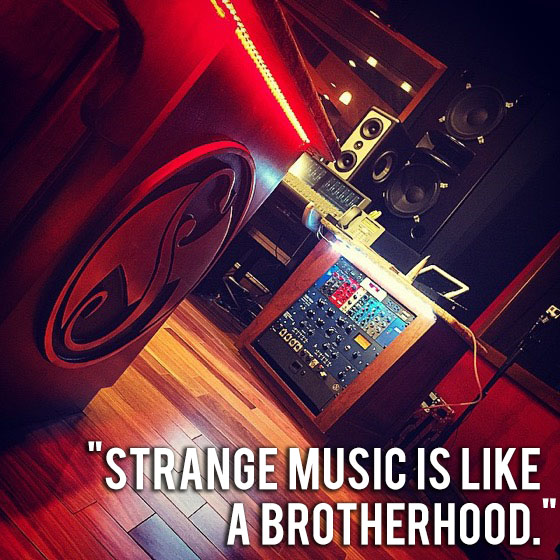‘My Vision Does Not Align With Mainstream Bullshit’ – Prozak Talks ‘Black Ink’ [SM Exclusive]
Sep 10 2015
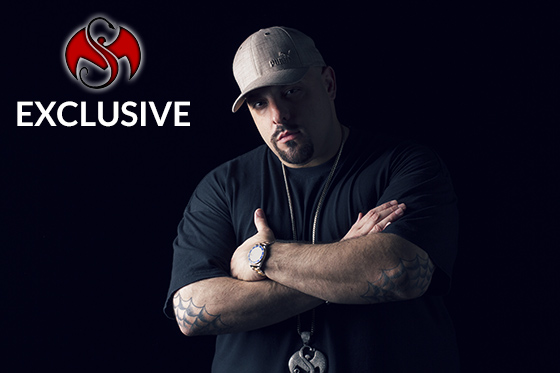
Prozak readies his fourth solo album under Strange Music with Black Ink, which is already proving to be his most anticipated release to date.
We talked to The Hitchcock of Hip Hop to get his perspective on the making of Black Ink and why this album proved to be a departure from his usual content. Prozak broke down for us why this is one of the greatest albums he’s put together, what makes it so different and why he decided to employ his Strange Music brethren to make it complete.
When you make music, what is your motivation as an artist?
I’d say my motivation is helping people. It’s making music that people can identify with. I feel like that’s my strength, lyrically. That’s the value that I bring to Strange Music: music that people can identify with, help them get them through life, and basically let them know that you’re not alone with depression, you’re not alone with anxiety.
I’m an outcast. I make music for outcasts. Look at the label. What’s it called? Strange. I’m Strange, they’re Strange. It works.
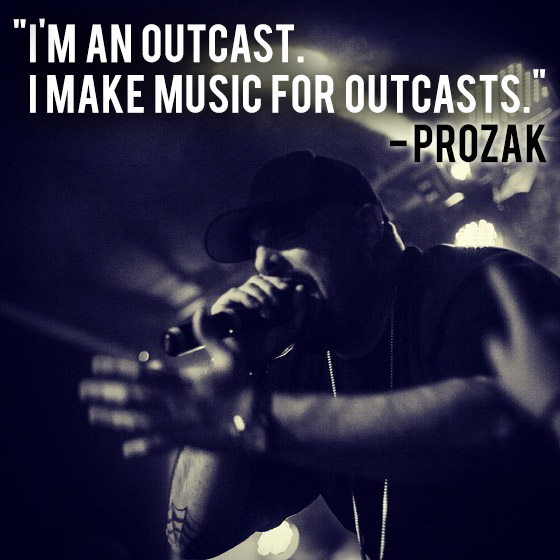
Is this the kind of music you used to gravitate to when you were growing up?
When I was younger I had kind of a – I don’t want to sound cliche – but I had a different kind of upbringing. I had a lot of anger as a kid. I kind of gravitated towards angrier music. Metal, stuff like that, just to vent the frustration and some of that kind of stuff. As you get older, the anger kind of wears off, and then it becomes something else later in life, then you start to realize how things have affected you and how it affected your life. The anger and the rage will subside and it almost becomes a depression as you look back and you realize that certain events kind of altered your course and you wonder “What would things have been like under different circumstances?” I feel like that’s where the turning point came for me. It was to start making music to help people, because I’ve already reached that part in my life.
The album is called Black Ink. What is the meaning behind the title Black Ink?
To me, Black Ink is everything. Black ink is your life, it’s your birth certificate, it’s your social security number, it’s your diploma, it’s your fingerprints, it’s your mind. Your life is traced in black ink. It’s unchangeable and it’s your life story, ultimately. That’s where the title came for me.
This record turned out to be a very personal album. I don’t do that typically. I don’t typically write about myself as much as I write about things or about certain issues or subjects. It just kind of morphed that way. That’s the difference between Black Ink compared to any other album, but at the same time I feel like Black Ink is the unofficial sequel to Paranormal. It’s also reminiscent of my earlier record Tales From The Sick, and at the same time there’s an evolution. I really can’t wait for people to hear this.
It seems this album has what got people to fall in love with you in the first place, but also brings something new.
Yeah. The last record I did, We All Fall Down, there was virtually no features on that record. Of course there was some people that came in and sang on choruses, but there were no rappers on the record. I try to make everything a little bit different each time out.
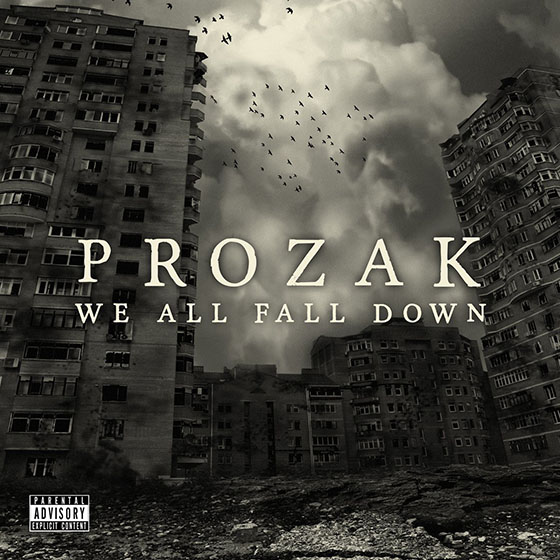
For this record I went back and embraced people on my label, people that I’ve worked with all my career. You’ve got, of course Tech N9ne, CES Cru, Krizz Kaliko, Twiztid, Madchild, Wrek and Bernz from ¡MAYDAY!. Everybody that was a part of this record, we all, Seven and I, we all feel like everybody delivered their best performances. It’s just a really tight, cohesive project.
I could honestly say that I couldn’t be happier with how Black Ink turned out. It’s crazy to feel that this thing that’s been in my head this whole time is now actually a reality and came out as close to what’s in my head as possible. Anytime you can do that, that’s big.
Did you come up with the title before you started working on the album?
Let me tell you about, and give credit where credit’s due, even though I can’t necessarily tell you who it was, but I was watching a documentary and I was watching one about death – I’m a weird dude, obviously, and I love watching obscure documentaries. Anyway, it was about people who had died and had come back, were revived, and this gentleman that was talking had a heart attack. He was describing how he was working on something on his computer and he said all of the sudden he had this feeling as if he was being pulled out of his body and that everything went completely tunnel vision and went black. The way he described it was, “It was like somebody had poured black ink into my eyes.” What he meant by that, when he elaborated, was if you started to close your eyes, your eyes are closed, it’s dark, but there’s still light, right? He said this was pure blackness, the abyss. That’s what he described the moment of death and the angst and the regret and everything that had been inside of him. That provoked something in me. Immediately I gravitated to that and started thinking of how that ties in with the project that I’m working on.
Did you have any pre-conceived ideas of how you wanted the project to sound or themes that you wanted to tackle?
Absolutely. When I initially started off working on this project it didn’t have a title. Me, personally, I like to start writing music and the title kind of works itself out. So, I started working on the project, and basically, I was setting out to deliver to my audience what they want from me, what they know from me, but also take it to a different level – whatever that level would be. It usually depends on frame of mind, what’s going on around you, the beats Seven gives me. Those are the vibes that end up being creative. But then, like I said, as I started writing songs, I noticed that more and more of my personal life and things that have happened to me started to slowly creep into the lyrics. At first I was a little uncomfortable with that because that’s not what I do, but at the same time, little by little, it felt like a weight was being pulled off my chest, like I was able to vent things and get them out of my system by doing that.
Typically, where I find that the most is when I perform live. A lot of people will tell me, you know, “You’ve got songs like ‘Until Then’ and ‘Million Miles Away’ and ‘Turn Back’ and all these things, you’re a really reserved, laid-back dude with some intellectual flow, but when you’re on stage you seem really angry. Why?” It’s not that I’m angry, I’m not angry at the audience, but there’s kind of a rage that overcomes me when I’m on stage. That’s not directed at the audience, that’s letting out a lot of what’s in here. Maybe because performing is a physical action and that’s what kind of triggers that. This record is giving me that same feeling, and more so, by just kind of unloading these issues and things that I have and dumping them on these tracks and just getting them out. So, Black Ink is almost therapeutic for me.
Was it a relief to be able to write songs like that?
In hindsight, looking back I would say yeah, it was a relief. It really was. It might give some of my audience a little more insight into who I am and why I write the type of material that I do, but more importantly, this record, to me, is getting out a lot of things. I went places I didn’t really feel comfortable with at first and wrote songs about certain things that have not been good experiences for me, like my brother dying a few years ago.
You have a very cinematic mind, obviously, from your film work. Do you make your album an audio movie or an experience similar to a movie?
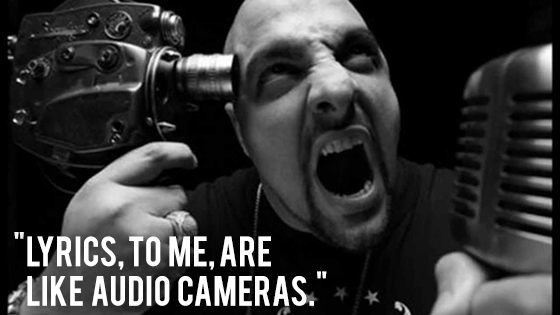
My perspective on film-making definitely crosses over to the music. Lyrics, to me, are like audio cameras. Syllables are paintbrushes. The way you word things, the way you craft your lyrics, can really paint a picture in somebody’s mind. I know I see a picture and a movie in my head with everything that I’m working on. Even the smaller things, like everyone that’s come in here and worked on the record, I’ve taken photos and videos of them to help promote the record. I really enjoy that because I feel like when the campaign for Black Ink comes out, a lot of the content is content that I physically created. I photographed and documented them the way that I wanted to, the way that I see it, so I guess that just makes it a little more personal.
What makes this album different than any other album you’ve done?
The elements of Black Ink that really stand out, as compared to other records, I would say the personal aspects. That’s not something I typically do, pulling things out of my life, my past, personal things.
I really embraced the Strange camp. It’s not that I typically don’t embrace them. They’re all friends of mine – we’ve toured together, However, a lot of these people I haven’t recorded with per say, especially for one of my projects. So getting all the brothers from Strange on the album, that, to me, is very different. It felt great. It really made me realize that Strange Music is like a brotherhood. That’s the best way to explain it. That’s what we are to our fans and that’s what we are to each other. This project really helped me see that, even more so. I’ve always felt lucky and privileged even more so today.
What do you think is going to take fans the most by surprise on this record?
I would have to say the raw emotion on some of these tracks. The cohesiveness of all the collaborations. Honestly, just from a rap standpoint, I feel like this is some of my best material, as far as evolving with flow, delivery and the crafting of those type of things. Honestly, as of right now, this is one of my favorite projects that I’ve ever worked on.
What makes it feel like that?
When you record a song and you’re able to listen to it over and over again. When you’re a recording artist, you come to the studio, you record some songs, you have a break in between, and when you can sit there and listen to what you just did repeatedly and feel really good about it, and it instills the emotion in you that you’re trying to convey to others, that’s how you know you’ve succeeded.
You and Seven have collaborated on so much together, and I know you’re a huge fan. What makes it so easy to work with him?
Let me first say that working with Seven, like I’ve said always, it’s definitely a privilege. It’s an amazing experience, and I think the reasons why is that he really listens to you, he really wants to find out what you’re trying to convey with each and every song, what’s the feeling behind it. It’s much more than “Hey, what tempo do you want?” or that type of thing. He digs deep and he wants to pull out of you what’s just kind of lurking there, waiting to be let out of its cage.
He definitely understands me as an artist and where I’m trying to go, what my abilities are, where I’m strongest. He’s not afraid to pull you out of your element either. Seven’s the kind of guy that will send you a half-time beat for you to double-time flow on, but at the same time he’ll send you a track that’s like virtual, hip hop, death metal. There’s really no limit to what he can do, and as we all know, there really is no limit to what Seven can do from a producer’s standpoint. It’s crazy how he doesn’t ever sound the same. When he wants to, he can change what he does completely. That’s why I like working with him best. He’s a true producer.
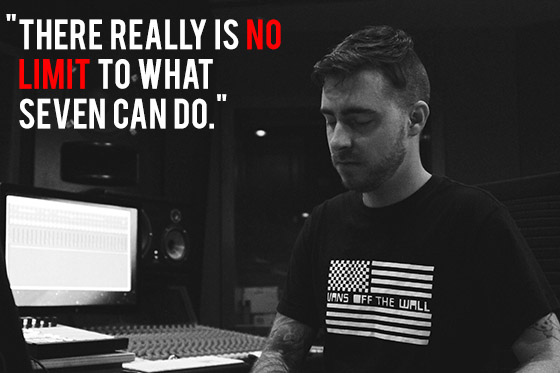
What kind of sounds did he provide for you on this album? Did you put any rock and roll in the album?
There are rock elements, but that’s definitely not the majority of the record. It does come in when it needs to. It does exactly emphasize certain tracks, but I would say the overall sound of the album is very melodic and it hits really hard. To me, when I listen to the music that Seven provided, it brings the album cover to life. It encompasses everything that I wanted to achieve. It’s the soundtrack for the project. He did it perfectly.
You were mentioning the collaborators on this album. What made you want to bring in so many, especially from the Strange Music camp?
To me the motivation behind it was, I’ve done a lot of collaborations in my life, with a lot of different artists and I’ve never really explored what was right here in front of my face. I never featured CES Cru on an album or Wrek and Bernz on an album, you know? I was listening to the Strange catalog a lot, listening to everybody and just trying to think who could be on the project, where they would fit, and how it would come out. To me, that was more important than “shooting for the stars” and trying to get “this” guy or “this” person. Big names are cool, for sure, but look at how much talent exists right here at Strange Music. Even though it’s not unusual by any means to see us all working together, it doesn’t typically happen on my projects. It was new to me and I think it will be new to my audience as well.
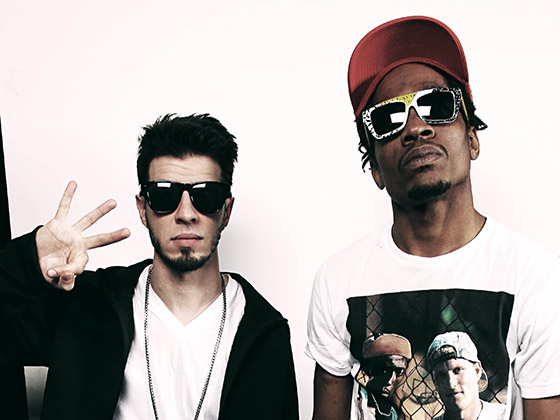
You and your fans have a great connection. How do you hope they’ll respond to this record?
You never really know, but the one thing that I do know is that Black Ink, to me, is everything that I wanted it to be. I think, as an artist, as long as you’re very happy with what you did, that’s what matters first and foremost. Don’t get me wrong, by no means am I saying that I don’t consider my audience when I write, but at the same time, as an artist, you don’t want to make music just for people’s reactions. To me, that falls along the lines of mainstream bullshit. “What’s going to sell?” and “What’s going to be popular?” But I do know my audience really well and I do know that I speak to a certain group of people mostly and I feel that they share the same type of angst and other feelings that I have – and that is amplified heavily on this record. I feel like they’re going to get a pure dose of what they were hoping to get.
How do you want this album to be remembered?
When I work on tracks it’s never about what’s popular. I couldn’t even tell you what the fuck is going on in hip hop. It’s funny, because I’m working with Seven and these cats, they’ll reference things and I’m like “Who’s that?” People look at me like “Really? You don’t know who blah blah blah is? Or this guy or that guy?” I’m just like “I don’t have a clue. I don’t listen to that shit.” So when I write tracks, to me, it’s about making a piece of music come to life in the best way possible through my ability and through my vision, and I know that my vision does not align with mainstream bullshit or trendiness, therefore I don’t feel like it’s ever going to be dated. So, I feel like if someone listens to what I do ten years from now, yeah technology has changed. You might be able to tell it was recorded ten years ago, but the content and the style will still be relevant, as it is not trendy.
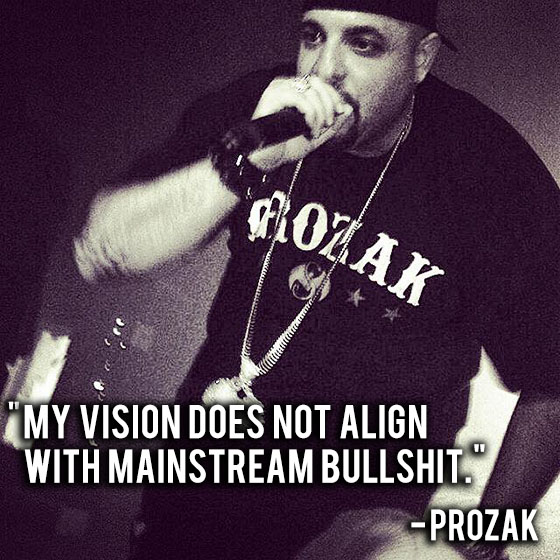
How do you want to be remembered, ages from now, when we look back on Prozak?
As an artist I just want to be remembered as a guy who did what he did best and did what he knew and vented out what he wanted to. That’s just what I do. I don’t follow a certain path. I don’t care about a genre. That’s why people have such a hard time with me. I’ve had publicists that I’ve worked with say to me “I have no idea what to do with your shit. What do you want me to do with it?’ They’re asking me, because they don’t even know how to market my music. A lot of people say to me “Dude, I’ve heard you do this, I’ve heard you do that. You can do these different styles, why not stick to one lane and go with what’s more popular? Maybe start double-time flowing all the time. You’ll sell more records.” But to me, if I have to not do what I want to do then this doesn’t mean anything to me.
It’s not about money. It’s not about popularity. It’s evolved. It’s not always been the case with what I’ve done musically, but it has evolved to me that I need to get out what’s in my mind and speak to people who feel the same way. I believe that what I do is therapeutic to those people.
You can’t get fucking desensitized to this. It’s easy to do, but you can’t get desensitized to Facebook messages that say “I tried to kill myself. I didn’t because of your music. Your music stopped me from killing myself.” I hear that stuff all the time. It’s worded slightly different, but it’s all the same. How do you get desensitized to that? At what point do you go “Eh, whatever”? I can’t do that. That’s a big responsibility. It became a responsibility. I didn’t expect this to happen. A few tracks kind of came out that way and then people started coming out of the shadows saying “Hey, this helped me. This saved me.” The more that I saw that, I thought to myslef “Wow, that’s really important. Maybe I should continue to do this,” because if I can really help people on that level, just by what I write and record, how do you not do that? So, that’s just kind of what it’s evolved into for me. It wasn’t my intention, but that’s what happened.
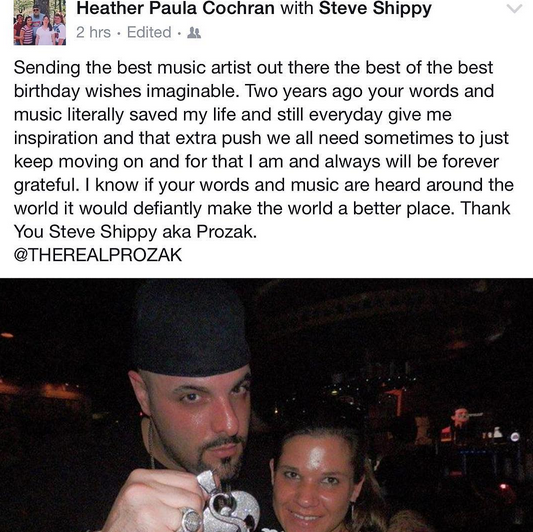
What’s your responsibility as an artist?
Let me tie that in with why I call myself Prozak. A lot of people ask that question: “Is it supposed to be a horrorcore thing?” like “Oh, I’m crazy!” No. When I grew up, my generation, there were two type of kids in the classroom, you were either a Prozac child or you were a Ritalin child. I’m the product of a pharmaceutical generation that was targeted. That was just the beginning obviously. We see that it’s worse today.
To me, it’s almost like a social/political statement. To me, the responsibility was just venting the frustration of this whole world – of society, of certain structures. Am I an anarchist? No, I’m not. Do I believe that there needs to be some sort of establishment? Of course I do. Sadly, and as people know from my lyrics, I do get very passionate or angry about people just being farmed. Farmed; guinea pigs. It’s all about money. It’s all about the corporate giant. I understand the benefits of capitalism versus communism or socialist government, but to a point, not to the point where people are literally farmed. I don’t know any other way to say that. There has to be a level of freedom. I’m trying not to spew out my political rhetoric. It’s there, but toned down lately in my music. One thing I do understand about music, it’s become more and more evident to me, is a lot of people enjoy music because it’s an escape from reality, right? So if I’m beating you over the head with how fucked the world is from every which way possible, to some people, yeah, they love that shit. They identify with it, like “I feel the same way. Let’s beat our chests and get this out there,” but then a lot of other people are like “Aw fuck man, Prozak with the doom and gloom! I had a bad day at work and he’s making it worse right now!” I try to tone back some of the angst, to some degree.
Who does your music give a voice to?
I give a voice to people that I call “People of the Outside.” In fact, a new song on my album will explain that. We are the people of the outside. We aren’t part of “this.” We’re on the outside looking in. We feel out of place. We all have our own reasons. Maybe it was our upbringing, maybe it’s for another reason. Whatever it is, we’re aliens in our own skin. Because of that, a lot of people will stay within themselves and not really establish relationships with other people or feel like they have kindred spirits and friendship. They don’t have that and I know what that feels like. That’s a really horrible place to be and I feel like my music lets people know “You’re not alone” and I feel like it’s also therapeautic and empowers them in a way like “This is part of life.” This is reality for a lot of people.
Not everybody is going to be successful in every which way possible, or maybe have certain looks – or whatever. Look at pop culture: it beats you over the head that you’ve got to have all these cars, this and that. Look at how celebrities are looked up to, almost like gods. To me, that’s pathetic. Fuck those people. Who cares? Take away all that shit, we’re all the same. When we’re all in the cemetary, we’ll all be equal. It doesn’t matter what the fuck your status is.

When you hear a song that has that effect, that you relate to, how does that affect you?
That feels incredible because it’s validation. “I’m okay for feeling this way. Nothing is wrong with me for thinking and feeling this way. I’m not alone thinking and feeling this way.” Just to give you one example, to me, Jonathan Davis, lead singer of Korn, his albums and certain songs truthfully saved me in a lot of ways through a period of time of a lot of…fucking up my life. Doing a lot of drinking and other things and kind of spiraling out of control. A lot of anger built up in me. His music let me get through a lot of things. Thinking about how that was for me and knowing now that I am the same thing to thousands of people, and now I have that responsibility, that’s all the fuel that I need to continue and to continue getting better and helping them out and helping myself out and making this type of music. Is it glamorous? No. Is it trendy? No. Is it popular? No. Am I getting rich from this? No. But I’m rich in memories. I have a fortune in positivity and to me that’s worth more than any of that stuff. This is my lane here at Strange Music. This is what I do best and I wouldn’t ask for anything else.
- What does Prozak’s music do for you?
Let us know in the comments section below.
